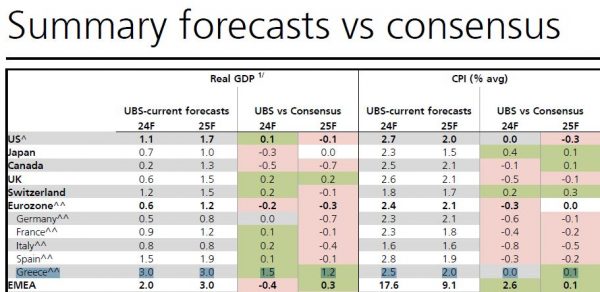Higher than the average estimate of foreign analysts, UBS places Greece’s growth, since it estimates that Greek GDP will grow by 3% in both 2024 and 2025. Inflation in Greece will also be very close to the European Central Bank’s target, with UBS estimates that it will be 2.5% next year, and 2% in 2025.

Cumulatively, Greece’s growth will be slightly higher than the growth achieved by the global economy, with UBS attributing this estimate to the weaker performance of China and the US. That is why it predicts that global growth in 2024 will be ½ percentage point weaker than in 2023.
As it commented, monetary tightening has driven the global credit push to its weakest level since the Great Depression of 2007/2008 (GFC), profit margins are under pressure and the labor market is showing signs of cracking. Its forecast would have been 1 percentage point below the long-term growth average, but potential growth is believed to have slipped lower and is now likely closer to 3%.
Markets are pricing in unusually little easing
According to UBS, on average, G10 central banks are expected to cut by 80 bp. over the next three years its interest rates, which means they will not return to neutral ground, nor will they of course be accommodative. Over the past 30 years, however, G10 central banks (excluding the BoJ) have cut interest rates by an average of 320bps. over a period of 15 months.
A wide gap between interest rates and growth
Real interest rates are now reaching levels traded in 2010 and 2005-06. At the time, the global economy was growing at a rate of 5-6%, more than double the growth rate expected in 2024.
As inflation eases toward 2%, central banks will find that policy rates are too high in real terms and are expected to cut rates at a faster pace than is priced in futures, particularly in the US, the estimate said. of UBS.
